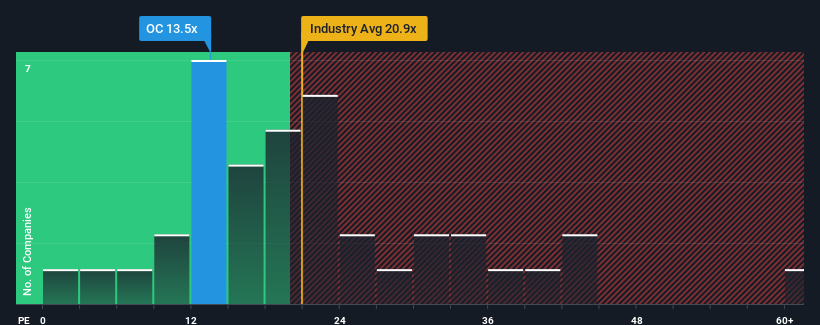
When close to half the companies in the United States have price-to-earnings ratios (or "P/E's") above 18x, you may consider Owens Corning (NYSE:OC) as an attractive investment with its 13.5x P/E ratio. However, the P/E might be low for a reason and it requires further investigation to determine if it's justified.
Owens Corning has been struggling lately as its earnings have declined faster than most other companies. The P/E is probably low because investors think this poor earnings performance isn't going to improve at all. If you still like the company, you'd want its earnings trajectory to turn around before making any decisions. If not, then existing shareholders will probably struggle to get excited about the future direction of the share price.
View our latest analysis for Owens Corning

Is There Any Growth For Owens Corning?
There's an inherent assumption that a company should underperform the market for P/E ratios like Owens Corning's to be considered reasonable.
Retrospectively, the last year delivered a frustrating 16% decrease to the company's bottom line. Still, the latest three year period has seen an excellent 37% overall rise in EPS, in spite of its unsatisfying short-term performance. So we can start by confirming that the company has generally done a very good job of growing earnings over that time, even though it had some hiccups along the way.
Shifting to the future, estimates from the analysts covering the company suggest earnings should grow by 12% per annum over the next three years. That's shaping up to be similar to the 10% per annum growth forecast for the broader market.
In light of this, it's peculiar that Owens Corning's P/E sits below the majority of other companies. It may be that most investors are not convinced the company can achieve future growth expectations.
The Bottom Line On Owens Corning's P/E
Using the price-to-earnings ratio alone to determine if you should sell your stock isn't sensible, however it can be a practical guide to the company's future prospects.
We've established that Owens Corning currently trades on a lower than expected P/E since its forecast growth is in line with the wider market. When we see an average earnings outlook with market-like growth, we assume potential risks are what might be placing pressure on the P/E ratio. It appears some are indeed anticipating earnings instability, because these conditions should normally provide more support to the share price.
You should always think about risks. Case in point, we've spotted 2 warning signs for Owens Corning you should be aware of.
If you're unsure about the strength of Owens Corning's business, why not explore our interactive list of stocks with solid business fundamentals for some other companies you may have missed.
New: AI Stock Screener & Alerts
Our new AI Stock Screener scans the market every day to uncover opportunities.
• Dividend Powerhouses (3%+ Yield)
• Undervalued Small Caps with Insider Buying
• High growth Tech and AI Companies
Or build your own from over 50 metrics.
Have feedback on this article? Concerned about the content? Get in touch with us directly. Alternatively, email editorial-team (at) simplywallst.com.
This article by Simply Wall St is general in nature. We provide commentary based on historical data and analyst forecasts only using an unbiased methodology and our articles are not intended to be financial advice. It does not constitute a recommendation to buy or sell any stock, and does not take account of your objectives, or your financial situation. We aim to bring you long-term focused analysis driven by fundamental data. Note that our analysis may not factor in the latest price-sensitive company announcements or qualitative material. Simply Wall St has no position in any stocks mentioned.
About NYSE:OC
Owens Corning
Provides residential and commercial building products in the United States, Europe, the Asia Pacific, and internationally.
Undervalued established dividend payer.
Similar Companies
Market Insights
Community Narratives



